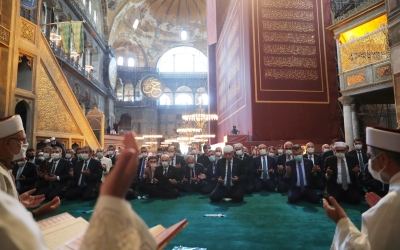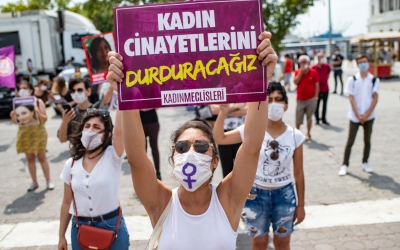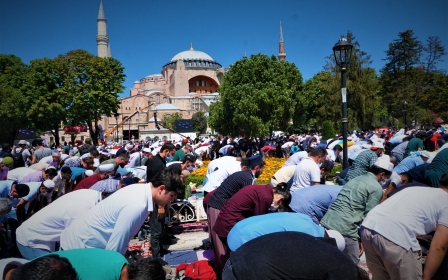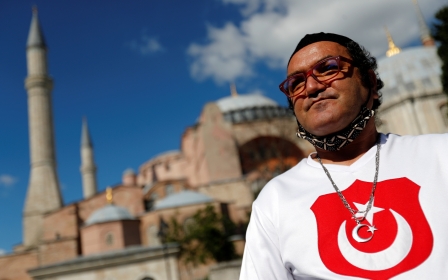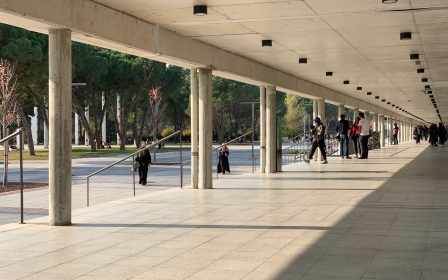Vulnerable and flagging in the polls, Erdogan rattles his base
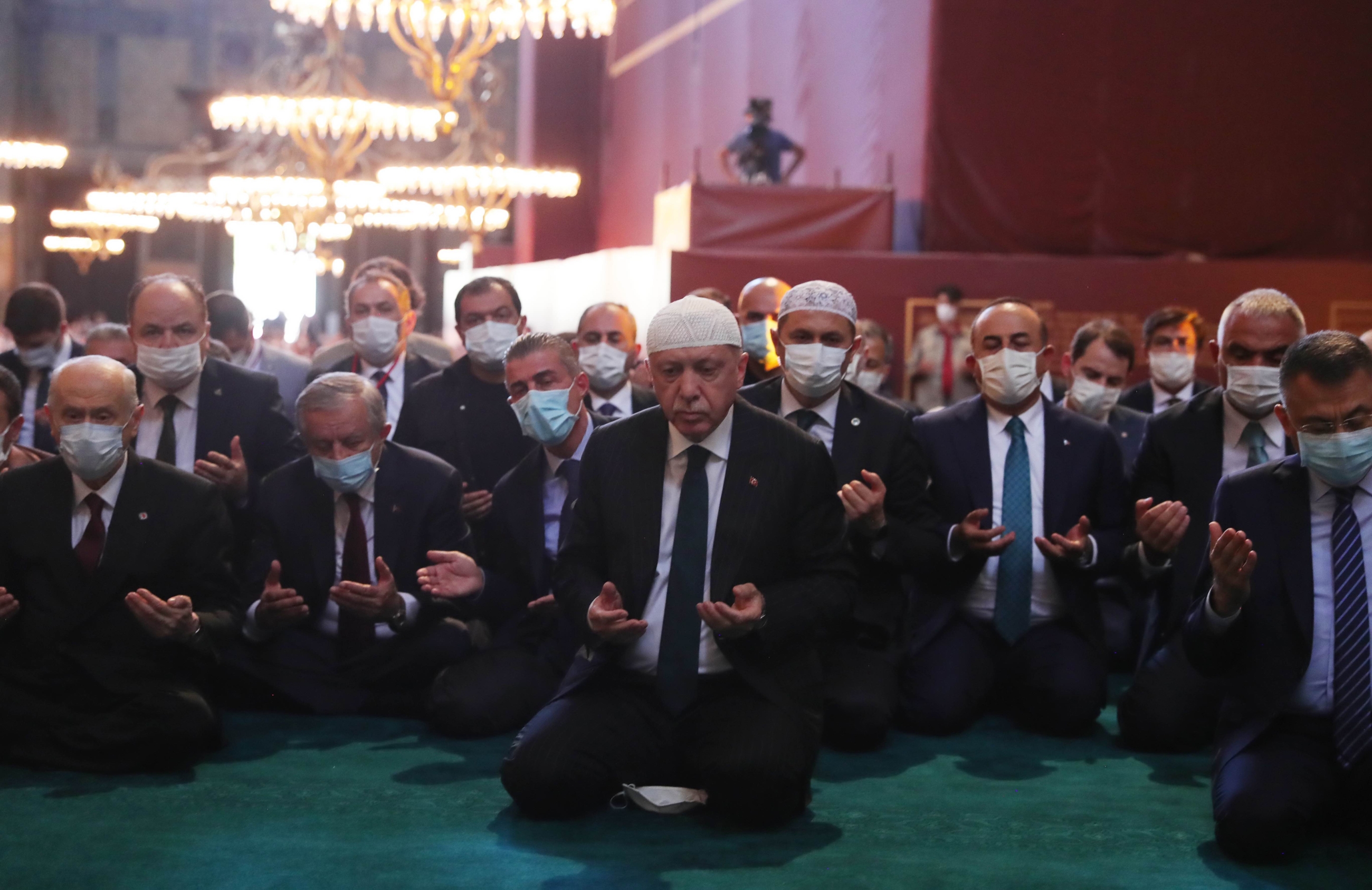
Turkish President Recep Tayyip Erdogan's comeback from the Covid-19 hiatus has been bold. For months, he kept himself far from cameras and instead let his minister of health handle public proceedings.
There were some occasional squabbles with the opposition, especially with municipalities on how to combat the virus, but mostly everything was uneventful. Then he started to take several steps together.
First, his ruling Justice and Development party (AKP) ratified a watchmen bill in June that effectively created a new law-enforcement body to guard the streets at night.
Once it was done, the AKP went on to break up the bar associations that are mostly chaired by lawyers critical of the government, allowing multiple bars to be established in one province.
Next, an angry Erdogan threatened to altogether ban social media sites in response to a tweet that insulted his newborn grandson and daughter. Now, the government is debating a new social media regulation that would force sites such as Twitter, Facebook and Instagram to open up representative offices in Turkey or face millions of dollars fines and restriction of user access.
Then Erdogan moved in with more controversial steps.
After a court decision, he personally reconverted the Hagia Sophia into a mosque. Then his associates promised to withdraw from the Istanbul Convention against violence against women for allegedly normalising homosexuality and destroying families.
He also declared homosexuals as "perverts" and called on the public to stand against homosexuality, while his associates pressured Netflix to remove a gay character from a TV series shot in Turkey.
Watching the polls
There are several explanations for Erdogan's motivations, yet almost all of them are tied to voting trends.
Since his first day in the office in 2003, Erdogan and his associates have been obsessively collecting polls and closely investigating what voters really want. That strategy, along with Erdogan’s political instincts, have kept him in power for the last 18 years. However, this time the numbers don’t look very good.
The Turkish economy was sluggish before the coronavirus crisis, but now it is in deep trouble. In one year, more than 2.5 million people lost their jobs, the Turkish Central Bank seems to have burned all of its net reserves to keep Turkish lira steady, and the budget deficit increased by almost 40 percent year-on-year in the first six months of 2020. Meanwhile, the lira lost roughly 15 percent of its value against the dollar over the first half of this year.
'The AKP’s grassroots are shrinking in size and Erdogan is becoming more vulnerable to demands from its own core voters'
- Berk Esen, Bilkent University
The voters' response to this has been brutal. Even though Erdogan appears to be preserving his personal backing, around 50 percent in favour, his party is suffering huge setbacks. Recent polls suggest the AKP’s support dropped to 34 percent earlier this year and after the coronavirus crisis further decreased to 30 percent, while the number of undecided voters increased to 10 percent.
"The AKP's grassroots are shrinking in size and Erdogan is becoming more vulnerable to demands from its own core voters," said Berk Esen, an assistant professor of international relations at Ankara's Bilkent University.
"Religious orders and religious communities are increasingly more effective in shaping the AKP’s agenda because the AKP addresses now a smaller voting base."
Reverting the Hagia Sophia into a mosque, in this case, has been a decades-long demand by religious conservatives, and also described by Erdogan himself as his “youth dream”.
"The move itself is a confirmation that the government is desperate," Esen added. He said that the AKP's mantra has always been taking steps to maintain its popularity and keep the opposition weak.
Conservative support
The Ismailaga, a faith movement based in Istanbul’s Fatih, and the Isikcilar religious community, which owns Turkiye, one of the country's newspapers, have been campaigning for Turkey's withdrawal from the Istanbul Convention in a country where the brutal murder of women by men is a common occurrence.
Their main argument is that the language used in the convention on gender is "destroying the binary categories of male and female", and empowering women in ways that make maintaining a proper family "impossible". A recent poll indicated that more than 51 percent of the public didn't even know what the Istanbul Convention was.
The same groups are also pressuring the government to take steps to restrict LGBT movements inside the country, from censoring Netflix programmes to cancelling Gay Pride marches.
New parties founded by former Erdogan allies such as Ali Babacan and Ahmet Davutoglu have been a worry for the AKP, because for the first time in recent history there are alternative parties on the centre-right that are focussed on stealing votes from the president.
"There is a risk that the voters who are distancing from the party could move to these new parties," said Nezih Onur Kuru, a political scientist. "This includes the religious conservatives."
There are more than three years until the next presidential elections, yet rumours are swirling in the capital that Erdogan’s nationalist ally Devlet Bahceli could call a snap election anytime he wants. Some opposition MPs expect that it will happen next year.
In any case, many also believe Erdogan is using topics such as the Hagia Sophia and Netflix to distract the public from the main issues, such as the economy. It is an attempt to shape the public agenda.
Indeed, the Turkish public and the international community have been debating on the Hagia Sophia for weeks, while new economic data released by the authorities confirmed the distress that Turkish working families are going through.
"By show of force, they are putting the AKP’s capabilities in the first rank of the public agenda," Kuru adds.
Kemal Can, a veteran journalist writing for independent news platform Gazete Duvar, underlined in his recent columns that, with or without “electoral reasons”, the government has been increasing its powers and say within society, from security to bar associations.
The recent proposal on social media is such an attempt. The draft law not only compels companies such as Twitter, Facebook and Instagram to immediately remove content on the orders of judges, it also opens the way to delete news stories on the internet based on the "right to be forgotten".
Critics say the powers will very likely be used to delete anti-government reporting from digital history.
Asked about the possible reasons for the government’s timing and rush on the subject, Yaman Akdeniz, a professor of law and the leading cyber-activist in the country, responded with only a sentence: "Because they can."
Middle East Eye delivers independent and unrivalled coverage and analysis of the Middle East, North Africa and beyond. To learn more about republishing this content and the associated fees, please fill out this form. More about MEE can be found here.


